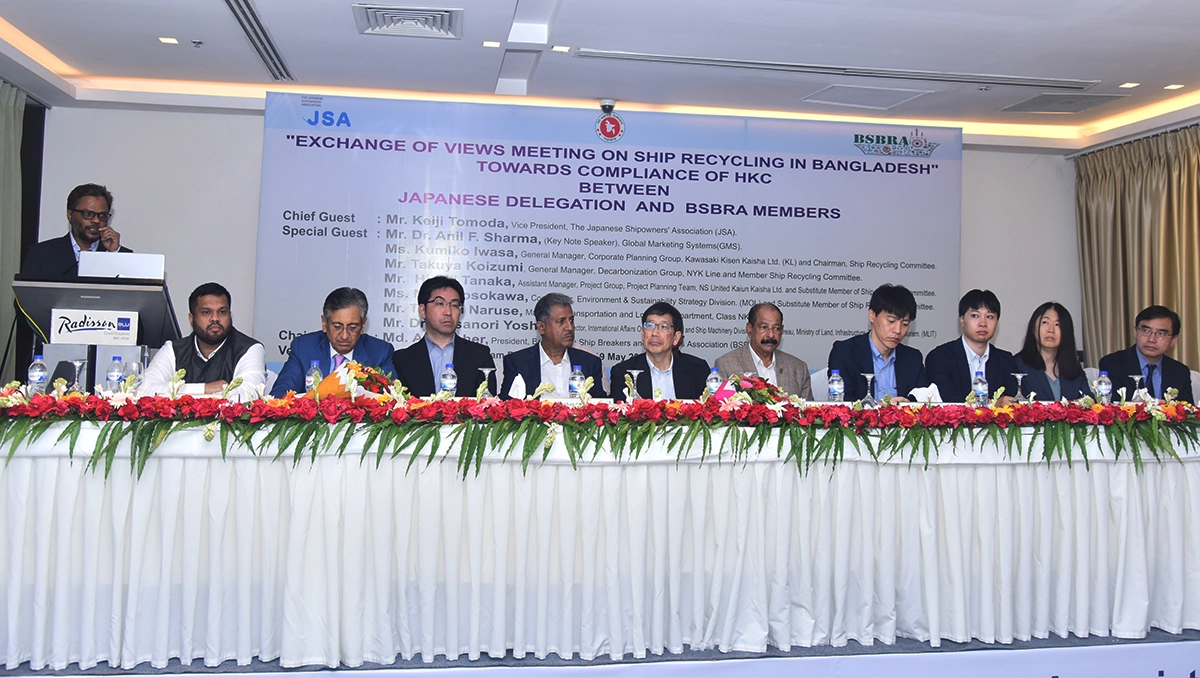Bangladesh and Japan Forge Strategic Partnership to Revolutionise Ship Recycling Industry
Chattogram | 31 July 2025

Bangladesh has embarked on a bold and transformative path to reshape its ship recycling industry, with Japan emerging as a critical strategic partner. This shift toward international compliance and environmental sustainability was at the forefront of a high-level seminar held today at the Radisson Blu Hotel in Chattogram, titled “Advancing Rustamatie Ship Recycling in Bangladesh.”
The seminar, jointly organised by the Japan International Cooperation Agency (JICA) and the Ministry of Industries of the Government of Bangladesh, brought together a powerful assembly of government officials, global maritime leaders, and industry stakeholders. The aim: to align Bangladesh’s shipbreaking industry with global environmental, safety, and labour standards—most notably, the Hong Kong International Convention for the Safe and Environmentally Sound Recycling of Ships (HKC).
Delivering the keynote presentation, ASM Shafiul Alam Talukder, Director General of the Bangladesh Ship Recycling Board (BSRB), laid out a comprehensive blueprint for reform. His presentation, titled “Strategic Policy Shift and Operational Reform in Ship Recycling,” captured the urgency and ambition driving the new direction.
“Effective from 26 June, Bangladesh has stopped issuing No Objection Certificates [NOCs] to any ship recycling facilities that are not compliant with HKC standards,” Talukder declared. “Out of 153 operational yards, only 13 currently meet HKC requirements. This gap is not just a challenge—it’s an opportunity to redefine our global standing.”
Talukder described a significant policy overhaul that has elevated BSRB from a passive licensing body to an active regulatory authority. Central to this transformation is the creation of a Compliance Monitoring Cell, empowered to oversee yard operations in real time, mandate third-party certification through Japan’s ClassNK, and ensure strict adherence to the Inventory of Hazardous Materials (IHM) protocols.
Japan’s involvement has been instrumental in Bangladesh’s transition. Through JICA, Japan has extended not just financial and technical support, but also high-level policy guidance. Infrastructure audits, yard layout modernisation, and compliance systems are being undertaken to align Bangladesh’s operations with global norms.
“This is more than aid—it is partnership,” said Yasufumi Onishi, Director of the International Affairs Office at Japan’s Ministry of Land, Infrastructure, Transport and Tourism (MLIT). “Japan is committed to ensuring that Bangladesh becomes a global model for responsible ship recycling.”
The collaboration is also driving significant legal and institutional change. Amendments to the Ship Recycling Act 2018 and the Ship Recycling Rules 2011 are under active review, intended to institutionalise reforms and reinforce the regulatory framework.
Looking ahead, Talukder announced two major initiatives scheduled for rollout in 2026:
-
Carbon & Compliance Dashboard: A digital governance tool that will introduce real-time data analytics to track carbon emissions and environmental compliance across yards.
-
National Training Institute: An educational facility focused on environmental best practices, safety protocols, and professional skill development for the industry’s workforce.
Additionally, a carbon trading pilot project is being designed to incentivise cleaner operations, potentially making Bangladesh a frontrunner in integrating carbon markets into ship recycling.
“Our target is to achieve 60 or more HKC-compliant yards by 2030,” Talukder stated, underlining the need for continued bilateral support and shared innovation.
The seminar featured insights from a wide array of global experts and national stakeholders. Professor Zakaria from Bangladesh University of Engineering and Technology (BUET) provided a technical analysis of sustainability challenges in the sector.
Hiroshi Ochi, General Manager of the Green Certification Department at ClassNK, explained the third-party auditing and certification mechanisms that are currently being implemented in partnership with Bangladeshi yards.
Other speakers included:
-
Md. Sajedur Rahman, Joint Secretary at the Ministry of Industries, who emphasised the need for strong regulatory enforcement.
-
Obyida Asadi, Director of Progressive Ship Recycling, who called for increased financial support to help compliant yards scale operations.
-
Hossainul Arefin, Director of Janata Steel Ltd, who stressed the importance of inflation-resilient pricing mechanisms for scrap metal.
Senior officials from major Japanese shipping companies—K-Line, MOL, NYK-Line, and NS United—were also present, underscoring international interest in Bangladesh’s evolving ship recycling ecosystem.
Despite the optimism and momentum, speakers acknowledged several challenges. High capital investment requirements, volatile global steel prices, and limited access to low-interest financing are significant hurdles for smaller and mid-tier yards.
Calls were made for:
-
Flexible loan structures to support green upgrades
-
International climate financing to accelerate compliance efforts
-
Technology transfer mechanisms to modernise operations quickly and affordably
“Responsible ship recycling is no longer a luxury—it is a necessity,” said Obyida Asadi. “We must not let financial constraints derail an otherwise visionary roadmap.”
A Global Precedent in the Making
Bangladesh’s renewed focus on compliance and sustainability could have far-reaching implications. As the world’s second-largest ship recycling destination—handling 34.6% of global ship dismantling tonnage—Bangladesh’s transformation could shift industry standards globally, especially among developing economies.
“Bangladesh is no longer following the tide,” said Talukder. “With Japan as our partner, we are steering the course toward a cleaner, safer, and more competitive future.”
The partnership between Bangladesh and Japan is increasingly seen as a blueprint for how emerging economies can reform traditional industries through international cooperation, regulatory innovation, and environmental accountability.
As global demand for green and socially responsible supply chains intensifies, the success of this initiative could also position Bangladeshi yards as preferred destinations for major shipowners seeking ethical end-of-life disposal for their vessels.
The seminar concluded with a renewed sense of purpose and urgency. Stakeholders committed to ongoing collaboration, transparency, and policy innovation to ensure that Bangladesh not only meets but leads in the global transition to sustainable ship recycling.
With Japan’s enduring partnership, Bangladesh is charting a new course—one where industrial growth aligns with environmental stewardship and international best practices.
Author: shipping inbox
shipping and maritime related web portal









